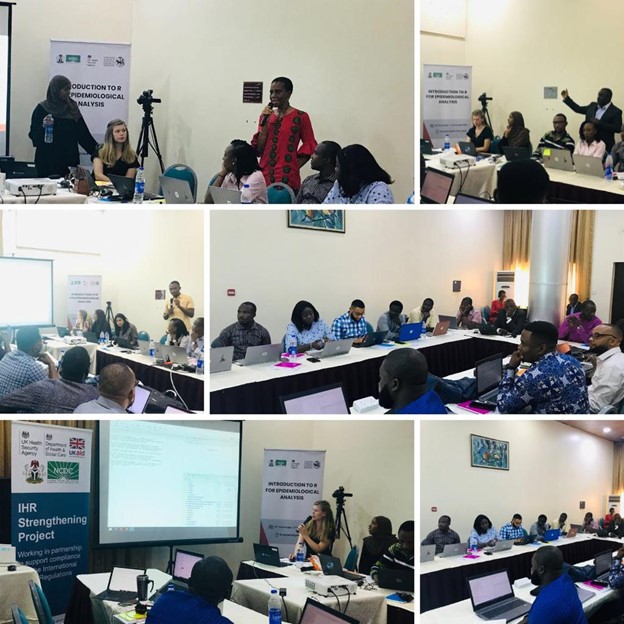
The COVID-19 pandemic presented significant challenges for the Nigeria Centre for Disease Control (NCDC) in terms of epidemiological analysis. Epidemiologists and data analysts struggled to keep pace with producing real-time analyses to guide response activities because of the limitations of the spreadsheet applications they routinely use and the lack of skills to transition to more complex applications for data analysis. In response, the NCDC reached out to the UK Health Security Agency (UKHSA) to help build capacity for more complex epidemiological analysis, including mathematical modelling in the long term. Following an introductory session and group discussion, a week-long training was developed by the UK Public Health Rapid Support Team (UKPHRST)* in collaboration with the IHR Strengthening Project to address the immediate needs of the NCDC.
In November 2022, the IHR Strengthening Project, UK PHRST, World Health Organization, and the London School of Hygiene and Tropical Medicine collaborated to deliver a training programme for 15 NCDC staff comprising of epidemiologists, scientific officers, and data analysts. The course, titled "Introduction to R for Epidemiological Analysis," was designed to be hands-on and focused on the specific needs of the NCDC, including automating data analysis processes, improving data visualization, and mapping skills, and adapting best practices in epidemiological analysis.
The success of the training is a demonstration of what partners working together, rather than competing, can achieve for global health security. Participants expressed excitement and newfound confidence in their abilities. Dr Hibo Asad of the UK Public Health Rapid Support Team praised the hard work and dedication of the participants and the facilitators alike, while Dr. Olusola Aruna, the country lead of the IHR Strengthening Project, emphasized the importance of utilizing the knowledge gained to improve decision-making by all stakeholders.
The participants made the commitment to continue to improve their knowledge by immediately setting up a network of R users in NCDC. Through this network, they intend to support each to on their journey to being confident users of R, and to work collaboratively on projects, where necessary. In her remarks, the Head of Department of Surveillance and Epidemiology of the NCDC, Dr Oyeladun Okunromade, expressed appreciation for the support provided by the UKHSA and other organizations and pledged NCDC’S commitment to continue investing in its workforce to achieve its strategic objectives. She also pledged to support participants to enable them to effectively deploy the skills acquired going forwards.

Dr Jerry Pantuvo
*The UK-Public Health Rapid Support Team (UK-PHRST) is an innovative partnership between the UK Health Security Agency (UKHSA) and the London School of Hygiene & Tropical Medicine (LSHTM), funded with UK aid from the UK Department of Health and Social Care (DHSC). The partnership has a unique and integrated triple-remit of outbreak response, operational research and capacity strengthening to support low- and middle-income-countries control infectious disease outbreaks that threaten public health